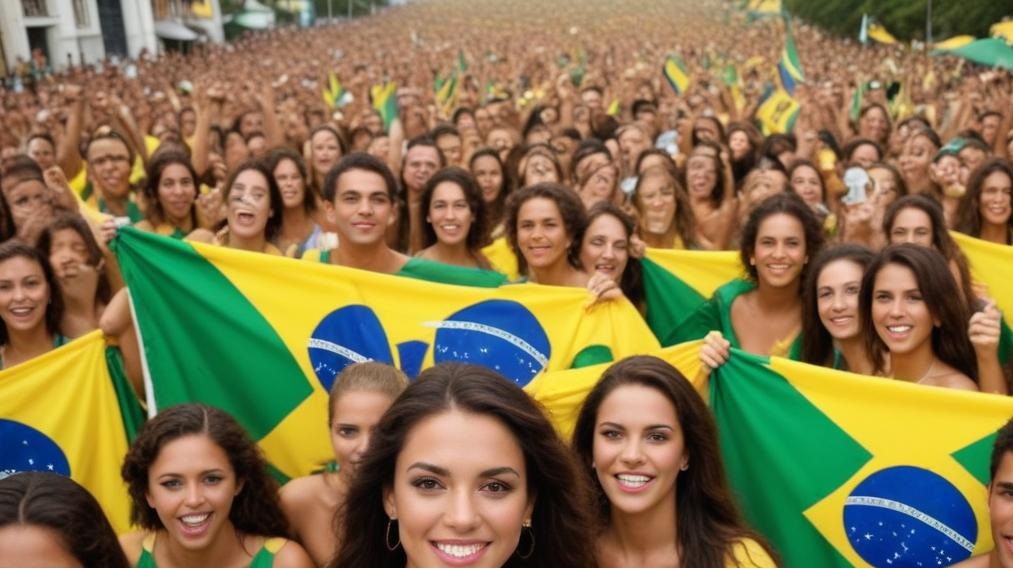Life Style
Who are Brazillian? History, Republic, & Style

Who are Brazillian?
Brazilians are people from Brazil, a large country in South America. They speak Portuguese, which is Brazil’s official language.
Brazil has a very colorful culture, and it is against the backdrop of heavy history and the number of people who live in this country. This includes beliefs from the Indigenous peoples of Brazil, the Portuguese Colonizers, Africans brought to Brazil as slaves, and people from Europe, the Middle East, and Asia who immigrated to Brazil.
This part will focus on presenting relevant cultural information about the country of Brazil. In general, Brazilians are friendly and hospitable. The actors of the movie embrace and kiss people on the cheeks when they first meet them.
Availability is highly valued in the Brazilian culture, and families particularly do like to be united. They also enjoy watching music and dancing; some of the most enjoyed types of dance include Samba and Bossa Nova.
Brazil boasts festivals where people mask and show with parades, music, and dancing, especially during carnival season.
Therefore, the people of Brazil referred to as Brazilians, are friendly and warm-hearted people with a fully packed diverse culture, music, dance, and strong family relationships.
Brazillian History
Early Inhabitants: They also experienced Brazil from the side of many Indigenous people who survived hunting, fishing, and gardening before the Europeans came.
Portuguese Colonization: The history of contact between African and Brazilian native cultures began in 1500 when Pedro Álvares Cabral, a Portuguese explorer, arrived in Brazil and took that land as a colony of Portugal. They formed colonies, and by the mid-16th century, sugar cane started being exported. Africans were permitted to be brought into Brazil to labor on the plantations.
Gold and Coffee: Then, in the late 1600s, gold was discovered in the region, and immigration boosted as more and more people flocked to the area in search of the precious metal. Coffee became another cash crop much later in the 19th century, thus giving the economy another boost.
Independence: Brazil claimed its independence from Portugal on the seventh of September in 1822 and dissolved into the Empire of Brazil, ruled by Dom Pedro the First.
Modern Era: Brazil became a republic in 1889 after a military coup d’etat retrieved the monarchy. Democracy and military rule had phases in Brazil during the course of the 20th century. It is now one of the world’s democracies which boasts of diverse cultures and natural resource endowment.
Brazillian Republic
It official is called the Federative Republic of Brazil. This means it is a republic with federal form of government. In a federal system, authority is divided between a national and a regional or state level, and it is exercised primarily through local governments. Brazil is divided into 26 states and one federal territory, in which the capital is the city of Brasília.
In Brazil, the year 1889 marked the beginning of a republic after a coup that dethroned the monarch. It has since gone through cycles of democracy and was and military rule in between. Present day Brazil currently has a democratic structure of government headed by a president followed by the National Congress and a system of judicial government.
The country boasts of a culturally and historically diverse region, natural resource endowments such as the Amazon Rainforest, and tourism attractions such as the Copacabana beach, among others.
Brazillian Style
Fashion:
Bright Colors and Patterns: Modern Brazilian clothing tends to be vivid and fiery and has been influenced by Brazil’s tropical landscape and diverse holidays.
Casual and Comfortable: Because of the hot climate, one size means loose and airy garments and comfortable, informal clothes. Sandals, particularly those known as ‘flip-flops’, are frequent footwear; the Brazilian brand Havaianas is particularly popular.
Beachwear: Since Brazil has numerous pretty coastlines, swimwear is quite popular when it comes to fashion. The type of bikini known as the ‘Brazilian cut’ is popular all over the world.
Interior Design:
Natural Materials: It can be seen that many interiors in Brazil imitate natural materials such as wood and stone.
Indoor-Outdoor Living: Dwelling units are open-air structures permitting cross-ventilations and lighting as appropriate for the tropical region.
Mid-Century Modern Influence: Brazilian style mid-century modern has firm and simple geometrical lines from a half-century ago.
Key Designers:
Lina Bo Bardi: An influential architect and designer known for her modernist works, including the Glass House in São Paulo.
Oscar Niemeyer: A prominent architect who played a key role in designing Brasília, Brazil’s capital, showcasing modernist architecture adapted to the tropical climate.
In summary, Brazilian style in fashion and interior design is characterized by vibrant colors, natural materials, and seamless integration with the environment, reflecting the country’s lively culture and tropical setting.

-

 Celebrity8 months ago
Celebrity8 months agoThe Private World of Marina Pearl LeBlanc, Matt LeBlanc’s Only Child
-

 Life Style1 year ago
Life Style1 year agoWho is Amra Nor Jenkins? The Untold Story About Jeezy’s Daughter
-

 Entertainment1 year ago
Entertainment1 year agoWhat is Shoujo Ramune? The Comprehensive Guide
-

 Celebrity1 year ago
Celebrity1 year agoThe Untold Truth of William Mapel: A Deep Dive into His Personal Life
-

 Celebrity1 year ago
Celebrity1 year agoWho is Christina Erika Carandini Lee? Everything About Christopher Lee’s Daughter
-

 News1 year ago
News1 year agoRanch World Ads Review: Everything You Need to Know
-

 Celebrity1 year ago
Celebrity1 year agoWho Is Stephanie Sarkisian? All You Need To Know AboutSteve Sarkisian’s Ex-Wife
-

 Celebrity1 year ago
Celebrity1 year agoThe Untold Story of Denika Kisty: Her Family, Net Worth, and More











